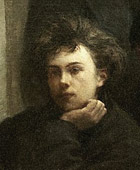When he was not yet 17, Arthur Rimbaud (1854-91) electrified Paris's literary society with the incendiary poems that later made him the guiding saint of 20th-century rebels, from Pablo Picasso to Jim Morrison. "A Season in Hell," "The Drunken Boat," and the prose poems of Illuminations were epochal works that changed the nature of an art form--and yet their author abandoned poetry at age 21 and spent the rest of his short life as a colonial adventurer in Arabia and Africa. "He was writing in a void," explains British scholar Graham Robb. "In 1876, most of Rimbaud's admirers either were still in the nursery or had yet to be conceived." Hardly surprising, since the poet was a difficult and frequently unpleasant person to actually know. The Parisian poets who took him under their wing soon discovered that Rimbaud was ungrateful, crude, and as scornful of their precious verse as he was of the Catholic Church, bourgeois proprieties, and everything else his disapproving mother held dear. Rimbaud's stormy affair with Paul Verlaine estranged the older poet from his wife and, eventually, from most of his artistic friends as well. In Robb's depiction, the poet possessed from his earliest youth a restless, searching intellect that permitted no compromise with convention nor tenderness for others' weaknesses. The author doesn't soften Rimbaud's "savage cynicism" or gloss over his frequently obnoxious behavior, yet Robb arouses our admiration for "one of the great Romantic imaginations, festering in damp, provincial rooms like an intelligent disease." Like Robb's excellent biographies of Hugo and Balzac, this sharp, subtle, unsentimental portrait is both erudite and beautifully written. - Wendy Smith
A Biography by Graham Robb |






